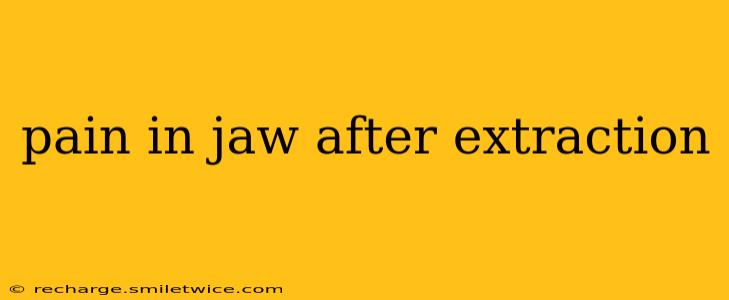Experiencing jaw pain after a tooth extraction is a common occurrence, and understanding its causes, effective management strategies, and preventive measures is crucial for a smooth recovery. This comprehensive guide delves into the intricacies of post-extraction jaw pain, providing you with valuable information to navigate this challenging period.
What Causes Jaw Pain After Tooth Extraction?
Several factors can contribute to jaw pain following a tooth extraction. The most common culprit is the surgical trauma itself. The extraction process involves removing the tooth from its socket, inevitably causing some degree of tissue damage and inflammation. This inflammation leads to pain, swelling, and discomfort in the immediate vicinity of the extraction site, often radiating to the jaw.
Beyond the immediate surgical trauma, other potential causes include:
- Dry Socket: This painful condition occurs when the blood clot protecting the extraction site dislodges or dissolves prematurely. This exposes the underlying bone and nerves, leading to significant pain, often described as a sharp, throbbing sensation radiating to the jaw.
- Infection: Bacterial infection at the extraction site can cause significant pain, swelling, and inflammation that can spread to the surrounding jaw area.
- Referred Pain: Pain originating from another source, such as a temporomandibular joint (TMJ) disorder, sinus infection, or even a problem with your neck muscles, can be perceived as jaw pain.
- Sinus Issues (especially upper molars): Extractions of upper molars are close to the sinus cavity, and complications can lead to sinus pain felt as jaw pain.
- Nerve Damage: While rare, damage to nerves during extraction can cause persistent pain, numbness, or tingling in the jaw.
How Long Does Jaw Pain After Tooth Extraction Last?
The duration of jaw pain varies considerably depending on the complexity of the extraction, individual healing responses, and the presence of complications. Generally, you can expect some degree of discomfort for the first few days, gradually diminishing in intensity over a week. However, significant pain persisting beyond a week or pain accompanied by other symptoms (fever, increased swelling, pus) warrants immediate medical attention.
What Can I Do to Relieve Jaw Pain After a Tooth Extraction?
Managing post-extraction jaw pain effectively involves a combination of strategies:
- Prescription Pain Medication: Your dentist will likely prescribe pain relievers to manage the initial post-operative pain. Follow their instructions precisely.
- Over-the-Counter Pain Relievers: Ibuprofen or acetaminophen can help manage mild to moderate pain. Always follow the recommended dosage.
- Ice Packs: Applying ice packs to the affected area for 15-20 minutes at a time, several times a day, can help reduce swelling and pain.
- Rest: Adequate rest allows your body to focus on healing. Avoid strenuous activities.
- Soft Foods: Sticking to a diet of soft foods minimizes stress on the extraction site.
- Gentle Rinsing: Gentle rinsing with saltwater can help keep the area clean and prevent infection. Avoid vigorous rinsing or spitting, as this can dislodge the blood clot.
Is Jaw Pain After Tooth Extraction Normal?
Some degree of jaw pain is considered normal following a tooth extraction. However, severe, persistent pain, or pain accompanied by other symptoms like fever, increased swelling, or pus is not normal and requires immediate medical attention.
When Should I Call My Dentist After a Tooth Extraction?
You should contact your dentist if you experience:
- Severe, unrelenting pain that isn't relieved by prescribed medication.
- Increased swelling or redness at the extraction site.
- Bleeding that doesn't stop after applying pressure for 30 minutes.
- Signs of infection, such as fever, chills, or pus.
- Numbness or tingling that persists beyond a few days.
How Can I Prevent Jaw Pain After Tooth Extraction?
While you can't entirely eliminate the possibility of jaw pain, following your dentist's instructions carefully and adopting a proactive approach can significantly reduce the risk:
- Follow Post-Operative Instructions: Adhering to your dentist's post-operative care instructions is paramount.
- Maintain Good Oral Hygiene: Good oral hygiene before and after the procedure helps prevent infection.
- Avoid Smoking: Smoking impairs healing and increases the risk of dry socket.
This information is intended for educational purposes only and does not constitute medical advice. Always consult with your dentist or healthcare provider for diagnosis and treatment of any medical condition. Remember, early intervention can prevent complications and ensure a smoother recovery.
